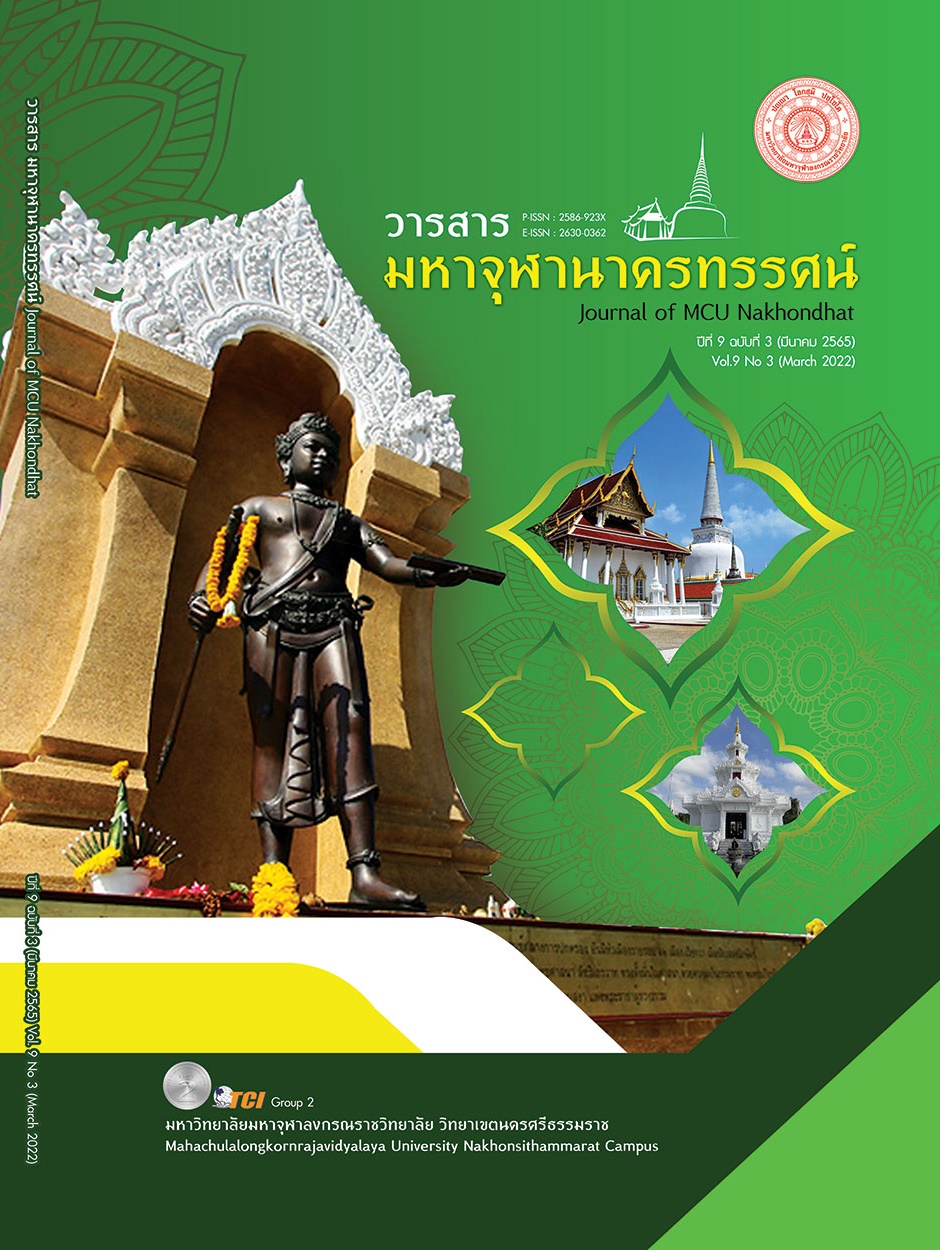THE FAKE NEWS IN THE DIGITAL AGE AND THE CONCEPT OF TRUTH IN EVERYTHING ON SOMG PHILOSOPHICAI VIEW
Main Article Content
Abstract
This Academic article on "The Fake News in the Digital Age and The Concept of Truth in Everything on some philosophical view" has two objectives: The Researcher want to present the results of analysis of the Concept of Truth of Everything (Life, World and Universe) and Analyze the Concept of Truth of the Fake News in the digital age is made clearer with some philosophical viewpoints of truth. I found that the Concept of Truth of Everything (Life, World and the Universes). I can be divided into two concepts: The Concept of Natural Truths or The Reality of Objective. The Concept of Mental Truths, which has two parts: some natural truths that the mind can later perceive and imagination Truths or Conventional truth. The Natural truths are subdivided into 3 characteristics: in the concrete nature of matter, the energy of matter and in various abstract ways, these three characteristics can be tangible with the five senses (eyes, ears, noses, tongues, nerves) or some may rely on the sixth sense of mind, the mind to perceive. Next to give value and assume a name for that thing. When we were interpreted some things that are imaginary are called "news", so they tend to have the same truth, falsehood, and falsity. For Mental Truths: it is some natural truth that the mind can later perceive. And the reality of Imagination Truths or Convention Truths that has gone through a long and complicated narrative such as beauty, goodness, morality, religion, mathematics, or the value of money, the value of gold, etc. When we used to interpret all things known as “news”, there are differences. It’s that the same news can be true news, fake news, or false news. It's like a digital system where one thing can be either the number 0 or the number 1, but at different times. (This is different from quantum computer systems that can be both 0 and 1 at the same time) It’s depends on the interpretation of each human or each party whether to use the criteria to decide the truth or usefulness of all things. What is called "news"
Article Details

This work is licensed under a Creative Commons Attribution-NonCommercial-NoDerivatives 4.0 International License.
References
คงกฤช ไตรยวงศ์. (2562). On Truth ว่าด้วยความจริง (หนังสือรวมบทความ). กรุงเทพมหานคร: สำนักพิมพ์ Illuminations Editions.
ปัณณทัต กาญจนะวสิต. (2561). โลก ๔.๐. เรียกใช้เมื่อ 20 ธันวาคม 2564 จาก http://www.dsdw2016.dsdw.go.th/doc_pr/ndc_2560-2561/PDF/ m8455/8455%.pdf
พระมหาสำรอง สญฺญโต และณัฐชยา จิตภักดี. (2563). กระบวนการแสวงหาความจริงในเชิงปรัชญาที่ปรากฏในเกสปุตตสูตร. Journal of Modern Learning Development, 5(4), 103-117.
พิจิตรา สึคาโมโต้. (2557). ข่าวลือท่ามกลางวิกฤตการณ์การเมืองในสื่อใหม่: กรณีศึกษาทวิตเตอร์ในวิกฤตการณ์การเมืองปี 2557 โครงการวิจัย สนับสนุนการวิจัยโดยสำนักงานคณะกรรมการส่งเสริมวิทยาศาสตร์. เรียกใช้เมื่อ 20 ธันวาคม 2564 จาก https://researchcafe.org/rumor/
ลอย ชุนพงษ์ทอง. (2564). ชุดพุทธธรรม. เรียกใช้เมื่อ 20 ธันวาคม 2564 จาก https://www.youtube.com/c/LoyAcademy/Playlist
สมภาร พรมทา. (2561). คำบรรยายวิชาปรัชญาปรากฏการณ์วิทยาและอัตถิภาวนิยม ตอนที่ 1-11 ของศูนย์ศึกษาพุทธปรัชญา มหาวิทยาลัยมหาจุฬาลงกรณราชวิทยาลัย. เรียกใช้เมื่อ 20 มกราคม 2564 จาก http://csbp.mcu.ac.th/
สมภาร พรมทา . (2561). คำบรรยายวิชาปรัชญาภาษา ตอนเก้า: ความจริงสี่แบบ ของศูนย์ศึกษาพุทธปรัชญามหาวิทยาลัยมหาจุฬาลงกรณราชวิทยาลัย. เรียกใช้เมื่อ 20 ธันวาคม 2564 จาก http://csbp.mcu.ac.th/
สมภาร พรมทา. (2562). คำบรรยายวิชาพุทธศาสนากับวิทยาการสมัยใหม่ ตอนที่ 5-7 ของศูนย์ศึกษาพุทธปรัชญา มหาวิทยาลัยมหาจุฬาลงกรณราชวิทยาลัย. เรียกใช้เมื่อ 19 กุมภาพันธ์ 2564 จาก http://csbp.mcu.ac.th/
Bradley, F. H. (1914). Essys on Truth and Reality. Cambridge, United Kingdom: Cambridge University Press.
Dyke, H. (2009). From Truth to Reality: New Essays in Logic and Metaphysics (EnglishEdition). 270 Madison Ave. New York: N.Y.1006: Routledge.
WICE Logistics. (2018). ยุค Digital 4.0 เมื่อโลกขับเคลื่อนด้วยเทคโนโลยี. Retrieved December 24, 2021, from https://www.wice.co.th/2018/01/11/digital-4-0-technology


